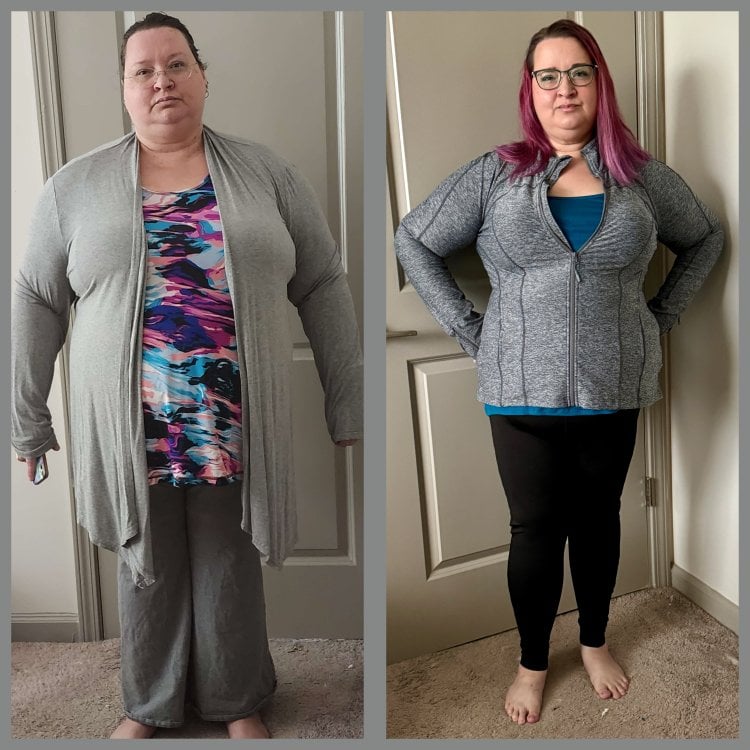-
Content Count
568 -
Joined
-
Last visited
-
Days Won
29
ChunkCat last won the day on April 26 2024
ChunkCat had the most liked content!
About ChunkCat
-
Rank
Aspiring Evangelist
- Birthday 03/25/1982
About Me
-
Biography
I am 32 flavors and then some...
-
Gender
Female
-
Occupation
Student
-
City
Raleigh
-
State
North Carolina
-
Zip Code
27615
Recent Profile Visitors
-
-
-
-
-
 Bessieboop1981 reacted to a post in a topic:
2 weeks post op with minimum restriction and present hunger
Bessieboop1981 reacted to a post in a topic:
2 weeks post op with minimum restriction and present hunger
-
-
-
-
-
Queen Boss Lady ke started following ChunkCat
-


Modified Duodenal Switch
ChunkCat replied to Lara in Arkansas's topic in Duodenal Switch Surgery Forum
I can't take any oral iron, so I'm not sure, really. I can't imagine a reputable company like them would put a fatal amount of iron in their product, as it would be very bad for business. 🤣 I just get iron infusions when my iron gets low, but it is ideal to take it in pill form if you can absorb it... You could try a few days a week and then have your levels checked to see if they are responding to the dosage. It is not usually a bad thing to start slow and ramp up if you aren't getting your levels up. And be sure to talk to your surgeon about it, as they can help guide you to what is a safe dose and do labwork regularly to be sure you aren't getting too much. ❤️ -
ChunkCat started following First Stall and I am scared, Intake Tracking, Head hunger/food noise and and 4 others
-
I use the Baritastic app. It tracks food macros and fluid intake. I track EVERYTHING that goes in my mouth, even condiments and coffee. LOL It helps immensely with staying on track. My Apple watch doesn't help with intake. It helps me remember to stand hourly. It counts my steps. It annoys me with messages all day. It reminds me to take my meds and vitamins. But it doesn't help with meals. Though there might be something to set in it to help with that? I just don't because my meal times vary a bit depending on when I wake up and eat my first meal. I highly suggest you get a pill case and dose out your vitamins for the whole week, or in my case, the whole month! A dietician can provide you with a list of supplementation or you can hunt down the ASMBS guidelines for your surgery, that's what most good dieticians use. It sounds like you may need to be watching your protein, fat, and calcium intake. Many people a few years out from the various surgeries start to show nutritional deficiencies if they haven't been keeping up with their protein intake and supplementation. Good hydration is important too. If you can, it would be wise to go have bariatric labs drawn, your GP can do this if you aren't still seeing your surgery center. A bariatric practice could do this too and would be good to follow up with if you are struggling with regain and getting back on track. You can do this!!
-
I remember the first time I realized I have food noise. I was given Saxenda and several weeks into it as I increased the dose, I noticed that the mental pressure to eat was gone... It was like that voice that often brought up food throughout the day was suddenly silenced. I never even realized it was there before, it was such a familiar thing in my mental landscape it didn't occur to me that not everyone has that! GLP-1 medications in general are known for this side effect. Meds for ADHD like Vyvanse and anti-depressants like Wellbutrin are also known to help with this. When I went off my Ozempic before surgery, the voice came back with a vengeance!! I didn't have much of a appetite pre-op, but man did it come back post-op... For the first month I was sooo hungry. And the voice was SO loud. Thankfully I have a lot of techniques to manage inner voices, due to a decade of somatic based trauma therapy. I think without that, the process would have been so much harder for me. One thing that helps me the most is distinguishing that part as a PART of me, not ALL of me. So instead of "I'm hungry!" it is "I'm noticing a part of me feels hungry." This may seem like a weird distinction, but research has shown when we do this with emotions "A part of me is angry." vs "I'm angry!") it helps us create a little space between us and the feeling and helps us remember that there are other parts of us present and not all of them are caught up in the emotion of the moment. Remembering there are parts of ourselves that are like Switzerland helps us navigate internally when voices get loud. So I apply this to head hunger too. I identify the part of me that is hungry. I ask it what it needs. I validate its experience. And then I offer to just sit with it for a while and be present with the feeling of hunger. Then I let it know when we are next going to eat and orient that part to thinking of what we might want to eat at the coming meal. I'm sure this approach won't work for everyone, it is just what I tend to do. I notice when I hear the parts of me that feel things and give them some presence, they often start to soften, or have something important to tell me about what we are experiencing in that moment. For instance, I have severe ADHD. I get easily distracted and forget to eat. Post op it has been a struggle. That voice is there to remind me to tend my body. It may be louder than most people have it, but it still serves a purpose and when I can give it a job it tends to fight with me less. I eat every 3 hours. Without exception. If I go past 3 hours the voices get really loud and I feel sick, probably my blood sugar dropping... So I eat every 3 hours. But I eat within a 30 minute window, then I'm done. I don't snack in between. If my body tells me we need more food before the 3 hour mark I stop to reflect why this might be. If it is because I am bored, I find something to redirect the energy to and wait. If it is due to a workout or being sick and burning through energy faster. I may add in an earlier meal. Seeing my body as something to partner with, as something I have a relationship with that I want to be a GOOD relationship, seems to help me remember to treat my inner voices with kindness and compassion instead of judgment and irritation. If someone you were closely connected to constantly ignored you or snapped at you, over time you'd either get louder or go away. That is what I did to my body. So now when I hear the voice it is a reminder that this is something I'm working to relate to in a healthier way, so I choose a reaction to it like I'd choose a reaction to a friend reminding me to eat or drink water. Sorry for the long ramble, it just happens to be something I've been reflecting deeply on over the past 6 months!! ETA: I do take Wellbutrin for depression. I have never noticed it affecting that internal voice, but some notice an impact. If you are struggling deeply with this voice, you might consider a medication that can support you in this. I have a good friend who has ADHD and noticed when she started Vyvanse it significantly helped with the food noise and binging behavior. It isn't a good solution for everyone, but it is a good solution for some. ❤️
-


2 weeks post op with minimum restriction and present hunger
ChunkCat replied to KaterinaC's topic in Gastric Sleeve Surgery Forums
There is nothing wrong with you... First, when we have surgery, a lot of nerves are cut that need time to heal. These are the nerves that tell us we are full, or getting full. So you are not getting accurate feedback from your stomach right now. These cut nerves take several months to heal fully. I noticed a distinct change in my fullness cues around 3 months out. Second--just because you CAN eat that amount doesn't mean you SHOULD (I'm so thankful the regulars here remind us all of this early post-op). You aren't getting accurate messages about your restriction right now, and different foods will cause different feelings of restriction or lack thereof. Try to stick to the small portions your dietician should have gone over with you. You have a lot of sutures holding your healing tummy together, you don't want to stress them. Take your time here, there is no rush. Third--different foods will cause different feelings of fullness. Purees often don't cause fullness, even meat purees. When you get into soft foods you might start to feel restriction when you eat denser proteins. But again, your stomach is still healing, so it may take time to feel your restriction, and some people never feel strong restriction, or don't feel it until they are overly full. This is where it is important to measure out your portions and eat tiny bites, slowly, watching for any signs of fullness. For us post op that may feel very different than it did pre-op. For me, for the first few months, all I would get is violent sneezing, intense hiccups, runny nose, etc... It took a while before I started feeling internal pressure with fullness. Fourth--Hunger is a b***h! Some people lose it, not everyone does. I woke up in recovery STARVING!! I was so mad. 😂I felt like I'd been given a faulty surgery. LOL But it really made me learn to work with my hunger cues and to sit with the discomfort of being hungry for a while. I was very, very hungry the first few weeks because nothing feels like it has enough substance to calm that ravenous hunger. This will ease in time as you progress your diet. For now all you can do is learn to distinguish head hunger from body hunger and learn to deal with the fact that sometimes we feel hungry and that's okay. Lastly, many people can drink water freely post op. You don't list your surgery, but this is very common with gastric bypass patients, though I have seen it with sleeve patients too. Once the internal swelling goes down, many can drink water easily. This is a blessing, since dehydration is the #1 reason bariatric patients end up in the ER post op! -


Did anyone else stall when...
ChunkCat replied to NickelChip's topic in POST-Operation Weight Loss Surgery Q&A
I've had this happen! My body seems to have some set points it is familiar with and I have noticed myself stalling at them or at least holding there for a week or two. My first stall post-op lasted 6 weeks and was at around the same weight I got to when I took Saxenda. I hope your stall is gone and over WAY before then!! It is interesting that your body picked that spot to stall at. I really wonder if the body has a variety of set points within it as opposed to just one. The way I understand it is that stalls mean our body has reached the point that we've lost enough it needs to reassure itself we aren't starving to death. So it stops weight loss, recalibrates, and assesses things before moving forward. It makes sense to me that for some of us this may happen at previous points of stalling or previous weights we stayed at for a while... -


November 2023 buddies
ChunkCat replied to brandycsiz's topic in PRE-Operation Weight Loss Surgery Q&A
Alright guys, 6 months is upon us!! This pic is from the morning of my 6 month post op visit. I weighed in at 232 in office. That is 88 lbs since my highest weight, 75 lbs since surgery! Weirdly, I am smaller now that I was last time I was at this weight. The surgeon found this funny and said the way our bodies lose weight can be really entertaining. LOL I startled myself the other day because I pulled out my smallest clothes (the smallest I have ever been as an adult was 195) and my size 16 jeans fit, zip easily, and are huge in the waist!! That means my smallest size, a 14, will probably fit now snugly, or comfortably in another month. How insane is that?? How can I fit into clothes I had to be 30 lbs lighter to wear last time?? Magic, that's how. 😂 The surgeon estimates I'll be at around 200 lbs by my year mark, though he said if I don't get quite to 200 to not stress it. We each lose weight at our own pace and with my common channel length I can expect to lose weight (albeit much slower) through the second year and possibly into the 3rd year, though at that point it'll be 1 lb here and there. This is the upside of the duodenal switch, it is a long, slow burn. Most stabilize around 18 months to 2 years, but there are always outliers. I feel pretty great! I had a hiatal hernia repair in mid April after I starting having issues choking on my food and pills not going down (I even ended up in the ER with it, which was awful, they don't get bariatric patients at all!!). I gained 15 lbs overnight and it took 2 weeks to get it off, so that on top of my stall for most of March really slowed my weight loss down. But that's okay, I'm reminding myself I have faith that it will come off in its own time. But man, it is hard to remember that when the scale goes up!! In other news, my GP and bariatric surgeon both think I have POTS. I've had issues with it on and off since having a bad case of Epstein Barr Virus (mono) that put me in the hospital a few years ago. It seems every time my body gets stressed it reverts back to having symptoms and it seems it counts any surgery as a major stressor (understandably). She referred me to a specialist and my appointment is October 24th, 2025. Uhuh, 2025, not a typo. He's booking 1 1/2 years out. There are only 2 doctors in the state that specialize in it. So I'm not a happy camper... Meanwhile we are trying a low dose of a beta blocker to see if it helps with the dizziness when I change positions, the racing heart rate when standing/exerting myself, and the exercise intolerance... And doing the lifestyle things like compression leggings, increasing salt and fluid intake, etc... It seems that a lot of Long Covid patients end up having POTS too. Have you looked into this @SomeBigGuy ?? How are you doing? How is everyone else doing?? -
I have no clue where to upload this, so I'll put it here. This is pre-op vs the morning of my 6 month appointment! In office I weight 232, that's 88 lbs down since my highest weight, 75 lbs since my surgery weight! I can't believe this jacket fit... I am smaller now than the last time I was this size which the surgeon found really amusing. He's happy with where I am in my weight loss and estimates I'll be around 200 lbs by my 1 year anniversary! My lowest weight as an adult is 195, so that's pretty damn exciting to think I'll be near that at a year. Everything from there will be unknown territory!!
- Show previous comments 1 more
-

-

So proud of you Cat. Getting into those smaller size clothes is half the fun isn't it?. Keep up the good work!!!!
-

-


I needed to talk…
ChunkCat replied to Vanessa Correal's topic in POST-Operation Weight Loss Surgery Q&A
Hi Vanessa! Is there something particular that has made you sad, or is this the weight loss blues (which are totally valid BTW)? I find empty theaters so soothing. I just wish they'd turn the movie down a little. I keep meaning to try going to see one with earplugs in, I hear that helps sensitive ears. 60 lbs that quick is amazing! My weight loss has been slower, but we all have our different paces... Have you struggled with depression before surgery? Sometimes surgery and the weight loss journey can trigger it. You are not alone. Thank you for posting and letting us know what you need. I will just say that if you were on medication for depression before surgery, you might want to touch base with your provider. Our surgeries can sometimes change the way we absorb our medications. I had to change mine around because I wasn't absorbing them properly and was slowly going through withdrawals, which was NOT fun! Thankfully all is well now, I knew to watch for that issue and we caught it quickly! -
When they do surgery often they tilt the table and it can put a lot of pressure on your lower spine/back. I've had multiple surgeries done and each time I have lower back pain for weeks because it pisses off the arthritis in my back when they tilt the table and I lay that way for hours. LOL I also got back pain as the weight started to come off at first. I don't know why it was worse then than now, but it was. I think it is because of the change in center of gravity, as noted above. If you notice you are needing pain meds for it or it is worsening, definitely ping your doctor about it. Oh and if you still have a uterus it could be cramping from that locale too. I used to feel that a LOT in my lower back before my hysterectomy.
-


First Stall and I am scared
ChunkCat replied to Lilia_90's topic in POST-Operation Weight Loss Surgery Q&A
Hi, welcome! I read the posts here a lot before my first post too and felt like I knew everyone even though they didn't know me! LOL It is a funny feeling... My first thought is you aren't eating enough to be physically active. The body is pretty particular about how much energy it gets and after bariatric surgery our metabolism gets a nice reset (it is part of what helps us lose the weight) but to maintain that nice, new metabolism we need to EAT. And what is enough when you are mildly active isn't near enough when you are doing things that strain your heart, muscles, and burn a good bit of fuel. So I agree with the above, I'd eat more on days you work out. 65 grams of protein isn't enough for working out, I'd add in at least a protein shake, a little healthy fat, and some complex carbs. Second, it is normal to stall for a few weeks at any point, but it is especially normal if you start working out, or if you increase your workouts. This is because it changes the fluid balance in our bodies and the body takes a bit to even out. Some people even see increases on their scale when they start adding in more workouts! So if that happens, don't panic. We can also stall when our food intake changes. This is commonly seen when you go from fluids to solid food, but it can also happen if you jump in calories at any point, even if it is a needed point. My stalls seem to last for 6 weeks at a time. It is super irritating. At 4 months out you are not likely to be done losing weight yet. You may lose a little bit more. But weight loss slows WAY down the closer to goal we get and you are on the small end at this point so I wouldn't be surprised if it slows now. The most rapid weight loss is the first 3 months, then it tapers off slowly depending on how much you need to lose. Since you are used to being at the lower end of your BMI it is reasonable to expect you may drop a bit more to have the space you want if you rebound some. Just be careful not to starve yourself to get those extra lbs off, if it isn't sustainable for your body you'll really have to fight for it and it could damage that nice new metabolism in the process! Oh, and weight redistributes after weight loss. So you may look a little thin now and it may balance out a bit in the next year. This happens especially around the face for some people. -


Can I have dandelion root capsules after surgery?
ChunkCat replied to K Ramirez's topic in POST-Operation Weight Loss Surgery Q&A
Dandelion can help with excess fluid. If I'm taking it in capsules, I usually take it in conjunction with milk thistle. Milk thistle is great for the liver and can help with excess fluid too. GAIA is a great brand that has a Milk Thistle blend I've taken before and liked, though I didn't take it for fluid issues. It may be worth talking with an herbalist to see what they'd advise. Sometimes herbs can be just as effective as prescription meds when given in the right ratios to the right person. I also know compression socks can help with fluid too, I wear them every time I travel and for weeks after any surgery... They can be annoying to find in the right size but wow do they help my legs not swell up! These are my favorite brand for compression. https://www.amazon.com/gp/product/B0897RWF54/ Way more comfortable than the socks and since they are open foot I can wear them with dresses and sandals all year round! -


Can I have dandelion root capsules after surgery?
ChunkCat replied to K Ramirez's topic in POST-Operation Weight Loss Surgery Q&A
I like it as a tea mixed with my coffee! I like chickory that way too. But yeah, dandelion is amazing. You could ask your surgeon. Far as I know it shouldn't be contraindicated after surgery once you are cleared for pills. It doesn't thin the blood or anything like that and it isn't a stomach irritant. -
Nah, I haven't had any issues with this post-op once I was past the nausea phase 3 months out. And OMG sex is so much better with less weight on your body! My boobs don't try to suffocate me quite as much... 😂 Maybe your tummy is just having an emo week? Go to bland foods for a few days to see if it settles down. I always revert back to plain foods when mine gets cranky pants, it seems to do the trick.
-
I like mine with roasted veggies too. It is pretty good as long as you rinse it well, cook it long enough, and flavor it well. My favorite way to eat quinoa actually is in these little canned tuna meals. https://www.amazon.com/Wild-Planet-Organic-Sweetcorn-Zucchini/dp/B0CHXRKKB2 Expensive, yes, but handy when I don't want to cook! I have never tried a boil in bag quinoa but I think it is worth a go! I'd probably put some chicken stock paste in the water to flavor it though...
-
-
-


Cramps, multiple cycles, and odor
ChunkCat replied to Bariiime's topic in Gastric Sleeve Surgery Forums
Hate to tell you this, but unless some miracle has happened in the past year, there is no test a doctor can do in office for endometriosis. The only conclusive way to diagnose endometriosis is by laprascopic exploratory surgery or in some rare circumstances, an MRI, though they don't usually do those to diagnose it. Surgery is considered the only definitive way to know and usually they remove it in the same surgery, as much as they can. There are a number of tests that can be done to detect PCOS however and I agree with the above poster, that should have been a go-to for your GYN. As should an intravaginal ultrasound to check the lining of your uterus. Odds are you may have had PCOS when you were a higher weight, which could have caused you to not ovulate and shed your lining month by month, leading up to a thickened lining which when your body ultimately tries to shed it can cause a lot of pain and heavy cycles. This lining can easily be seen by ultrasound. The proper way to deal with that IS a D&C, but I wouldn't have a D&C (and I've had 3 of them over the years) without first seeing it on ultrasound. Ultrasound can also show things like fibroids which could have been caused by the odd hormone surges as you've lost weight. Treatment for fibroids is often surgery and I'd want to be sure they were knocking me out for the RIGHT procedure. I too would recommend you find a new doctor and get a second opinion. You are your most important advocate. ❤️



















